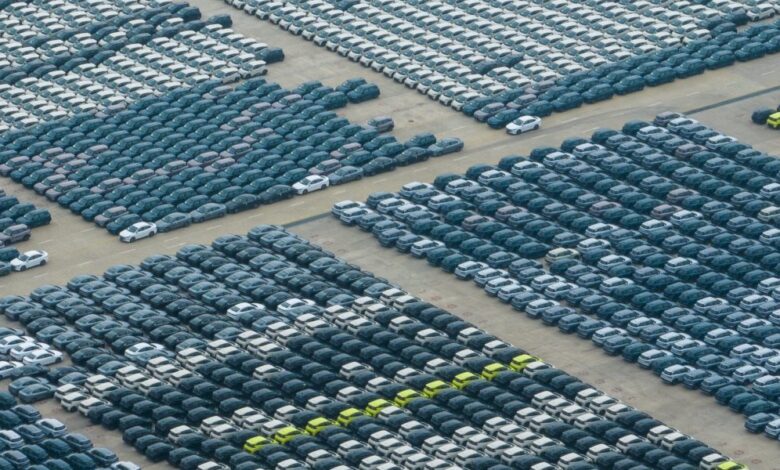Beijing complained to the WTO about the EU’s new electric vehicle tax


Beijing said on Wednesday it had filed a complaint with the World Trade Organization over the European Union’s decision to impose heavy tariffs on Chinese-made electric cars.
Additional tariffs of up to 35% were announced on Tuesday after an EU investigation found Chinese state subsidies were undermining the value of European carmakers, but the move has faced opposition from Germany and Hungary, which fear it will provoke Beijing’s anger and spark a bitter trade war.
China criticized Brussels’ decision on Wednesday morning, saying it had not “agreed to or accepted” the tariffs and had filed a complaint under the World Trade Organization’s (WHO) dispute resolution mechanism. .
“China will… take all necessary measures to firmly protect the legitimate rights and interests of Chinese companies,” Beijing’s Ministry of Commerce said.
EU trade chief Valdis Dombrovskis said on Tuesday that “by adopting proportionate and targeted measures following a rigorous investigation, we are standing up for fair market practices and for the European industrial base”.
“We welcome competition, including in the electric vehicle sector, but it must be underpinned by fairness and a level playing field,” he said.
But Germany’s main auto industry association warned the tariffs raised the risk of a “deepening trade conflict”, while a Chinese trade group criticized the immediate “politically motivated” decision. even as they urge dialogue between the two sides.
These tariffs will be higher than the current 10% rate for electric vehicles imported from China.
The decision became law after being published in the EU’s official journal on Tuesday and the tariffs will take effect from Wednesday.
Once they do, the tariffs will take effect definitively and last for five years.
Additional tariffs also apply, at various rates, to vehicles produced in China by foreign corporations such as Tesla, which faces a 7.8% tax.
Chinese auto giant Geely — one of the country’s largest sellers of electric vehicles — faces an additional tax of 18.8%, while SAIC will be hit with the highest tax rate of 35.3%.
Sick company
The tariffs do not have majority support in the EU’s 27 member states but in a vote earlier this month the opposition was found unlikely to block them, which would require at least 15 countries. representing 65% of the bloc’s population.
The EU launched the investigation to protect its auto industry, which employs about 14 million people.
France, which pushed for the investigation, welcomed the decision.
French finance minister Antoine Armand said in a statement: “The European Union is taking an important decision to protect and defend our commercial interests, at a time when the EU’s auto industry We need our support more than ever.”
However, Europe’s larger carmakers, including German auto giant Volkswagen, have criticized the EU’s approach and called on Brussels to resolve the issue through negotiations.
President of the German Automotive Industry Association Hildegard Mueller said Tuesday after the announcement that the additional tariffs were “a step backwards towards global free trade and therefore towards prosperity, preservation jobs and growth in Europe”.
Volkswagen, which has been hit hard by growing competition in China, previously said the tariffs would not improve the competitiveness of the European auto industry.
That warning came weeks before the ailing giant announced plans Monday to close at least three factories in Germany and shed tens of thousands of jobs.
Retaliation move
Negotiations continue between the EU and China and the tariffs could be lifted if they reach a satisfactory deal, but officials on both sides have pointed to differences.
Discussions focused on a minimum price that would replace taxes and force automakers in China to sell vehicles at a certain price to offset subsidies.
“We remain open to finding a viable alternative that is effective in addressing the issues identified and compatible with the WTO,” Dombrovskis said.
The Chinese Chamber of Commerce in the EU called on Brussels and Beijing to “accelerate negotiations on setting minimum prices and ultimately eliminating these tariffs.”
The EU could now face Chinese retaliation, with Beijing announcing on October 8 that it would impose temporary tariffs on European spirits.
Beijing has also launched an investigation into EU subsidies on some dairy and pork products imported into China.
Trade tensions between China and the EU are not limited to electric cars, with Brussels also investigating Chinese subsidies for solar panels and wind turbines.
The EU is not alone in imposing heavy taxes on Chinese electric cars.
Canada and the United States have in recent months imposed much higher 100% tariffs on electric cars imported from China.
Data sheet: Stay at the forefront of the business of technology with insightful analysis of the biggest names in the industry.
Register here.




